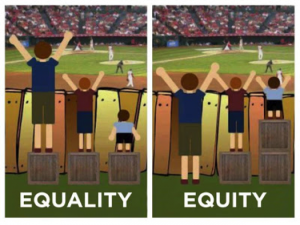I appreciated how Heather recognized that she might not have the entire picture w/r/t my intentions, and that I might not really know what I'm asking for, but kept deepening our conversation through a number of methods:
- Asking a mixture of open-ended and clarifying questions "Would you say you're more interested in these data or would like to find more sources?" "What were the instructions you received from your teacher?""What do you think about using this type of statistic?"
- Not expressing frustration when things became more complicated or ambiguous, but rather communicating verbally and non-verbally that she was continuing to investigate with me and was invested in learning the outcome with me.
- At a few points I didn't know how to answer a follow-up question because it fell out of the prompt given and I couldn't come up with an answer quickly enough (I did invent the "my teacher is going to grill me on this data" angle but didn't invent a specific assignment, for example). In those moments I felt genuinely flustered, and I appreciated that Heather again made some space for me to process my thoughts and didn't overly press her line of questions, but rather looped back and tried other ways to get at the information.
This experience really reiterated our focus on the class on compassion, strong non-verbal cueing, careful selection of questions and more broadly questioning strategies, and the importance of "geeking out together" as an ethic.
It will be interesting to see how the types of questions that students bring to librarians will shift over time as the amount and complexity of digital information increases. If, as Alyssa and others mentioned, we continue to enter this kind of post-truth moment where information is contested and information literacy skills do not keep up with the increasing importance of digital information, librarians may have to field even more complex versions of these back-and-forths over the meaning and context behind statistics and other data. What might those trends look like in light of future employment trends like computer/robotic automation and the increasing specialization and complexity of tech jobs? How can librarians, as some of the folks on the front line of digital information literacy shifts, pass along their insights and experiences to educators and others who can teach the necessary skills, or should librarians demand more opportunities for information literacy instruction as we've discussed?
Also: is there something particular going on in our society today with regard to over-reliance on statistics and predictive modeling versus other kinds of research and data? What role might librarians have in helping communities and learners seek wisdom and clarity in the questions asked of data and digital systems? I've been thinking about this "how do we ask the right questions and use information and digital resources with wisdom and clarity of purpose" issue -- I intuitively feel librarians can play a huge role through these kinds of front-line conversations with patrons and students, but I'm still learning what that might look like day-to-day in our professional lives.




